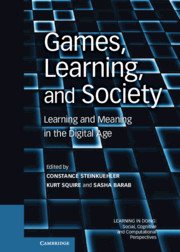
-
Select format
-
- Publisher:
- Cambridge University Press
- Publication date:
- 05 August 2012
- 11 June 2012
- ISBN:
- 9781139031127
- 9780521196239
- 9780521144520
- Dimensions:
- (228 x 152 mm)
- Weight & Pages:
- 0.77kg, 480 Pages
- Dimensions:
- (228 x 152 mm)
- Weight & Pages:
- 0.66kg, 490 Pages
You may already have access via personal or institutional login
Book description
This volume is the first reader on video games and learning of its kind. Covering game design, game culture and games as twenty-first-century pedagogy, it demonstrates the depth and breadth of scholarship on games and learning to date. The chapters represent some of the most influential thinkers, designers and writers in the emerging field of games and learning - including James Paul Gee, Soren Johnson, Eric Klopfer, Colleen Macklin, Thomas Malaby, Bonnie Nardi, David Sirlin and others. Together, their work functions both as an excellent introduction to the field of games and learning and as a powerful argument for the use of games in formal and informal learning environments in a digital age.
Contents
Metrics
Altmetric attention score
Full text views
Full text views help Loading metrics...
Loading metrics...
* Views captured on Cambridge Core between #date#. This data will be updated every 24 hours.
Usage data cannot currently be displayed.
Accessibility standard: Unknown
Why this information is here
This section outlines the accessibility features of this content - including support for screen readers, full keyboard navigation and high-contrast display options. This may not be relevant for you.
Accessibility Information
Accessibility compliance for the PDF of this book is currently unknown and may be updated in the future.

